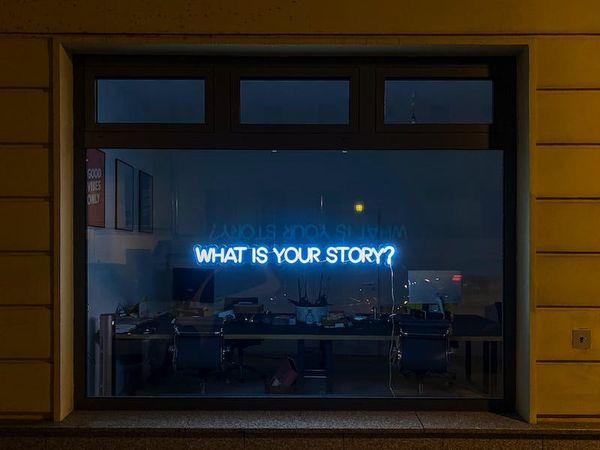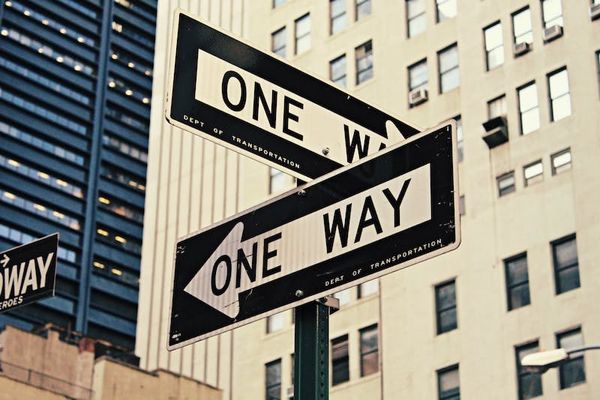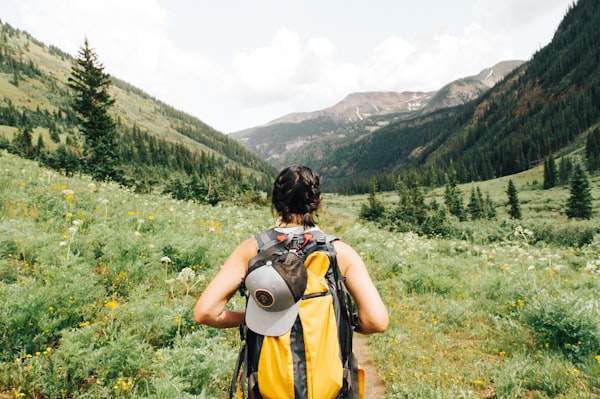The 2 systems of motivation - Pt.2: Dopamine
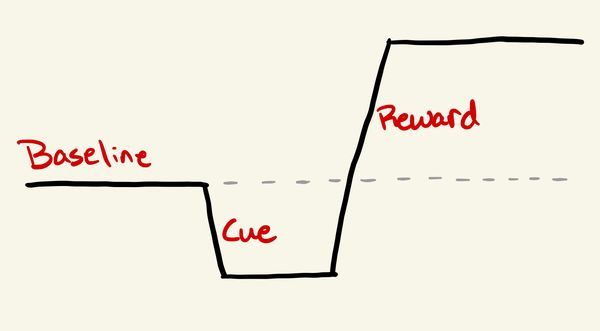
Welcome back to the Effortless Action Newsletter! Every Wednesday, I share findings from across a range of disciplines to better understand “What gets us to take action?”
This is the second issue on the 2-part series on the two main systems of motivation in the brain. ( Check out the first one here if you missed it! )
This week, we’re diving into dopamine.
Your brain on dopamine
Dopamine is a neurotransmitter that is the main driver of wanting and craving. It isn’t the only neurotransmitter involved in this reward processing, but many neuroscientists agree that it is among the most important.
In the past, some believed that dopamine was the cause of enjoying things, but more recent research has found that it controls our drive to get this enjoyment or a reward.
So how does this molecule work?
The baseline
Our brains have a level of dopamine that they’re used to, referred to as the baseline.
When our levels drop below our baseline, we have a craving to bring it back up by means of dopaminergic-rewarding activities. That’s the itch, or the craving you feel.
When we expect a reward, our dopamine levels go a little wild.
If there’s a cue that we’ll get some sort of reward, our dopamine levels decrease to below baseline levels. But once we get that reward, our dopamine levels surge above baseline.
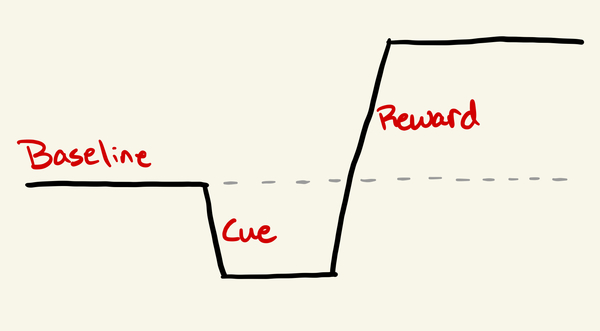
However, if we don’t get that reward, dopamine levels fall drastically – far lower than where we were before the cue. This is Reward Prediction Error, which we’ll talk about in a future issue on expectations.
That’s all great, but how does this influence our motivation for day-to-day activities?
Dopamine’s impact on motivation is relative.
There are two main points we need to understand to see how dopamine influences our ability to take action.
First, different activities release different amounts of dopamine. Snorting a line of cocaine and receiving a like on one of your tweets is going to release very different amounts of dopamine.
Second, the amount of motivation you receive from dopamine is dependent on comparisons to past levels.
You can think of this as a currency. As with wealth, it’s all based on comparison – you want to know how much you currently have versus how much you had in the past. A $1,000 paycheck will feel very different for those used to either $100 or $10,000. The person who’s used to $100 paychecks is going to feel amazing, whereas the person used to $10k is going to be severely disappointed.
This ties into our day-to-day motivation to take action.
If we’re filling our days with quick and easy dopamine hits from social media, video games, etc., the dopamine released by those activities is going to surpass the dopamine you receive by doing the hard work that matters to you.
There’s no biological reason for you to create or build something when you could get 10x the dopamine from something else that is 10x easier to do.
What to do
The best thing you can do is reflect and realize if you have a dopamine-releasing activity that you do in place of your work.
This could be something like gambling, porn, or drugs, but it can also be something tamer, such as reading romance novels, browsing social media, or playing video games. Any sort of activity where you’re searching for a reward or looking for the next best thing (even something simple like the next best productivity tip).
If that searching and craving is keeping you from doing the work you want to be doing, then the best thing you can do is completely abstain from the activity for 30 days.
It’s hard. I’ve done it with some things in my life, and it’s difficult. You have that itch to return to the activity, and it feels like you can’t think about anything else. But if you take it a day at a time, soon the temptations will grow lighter, and your brain will re-adjust its baseline.
After the 30 days are up, if you can totally forget about the activity and never do it again, then great. Otherwise, be careful with how you re-integrate it, and set boundaries on when and where you bring this activity back into your life.
If you’re struggling with dopamine, I’d recommend reading Dopamine Nation by Dr. Anna Lembke . Even as someone who thought “pfft, I don’t have any addictions,” it was eye-opening to see the number of things in my life that dopamine influences.
If you’re more of an audio-visual person, check out Dr. Andrew Huberman’s deep dive on dopamine , or his interview with Tom Bilyeu if you want something a little less technical (I recommend watching the interview first).
Thanks for reading!
Hey you. Thanks for reading to the bottom!
If you enjoyed this, there’s much more to come. I’d love to hear your feedback, you can simply reply to this email or click on one of those little “Did you enjoy this issue?” responses right below the next paragraph.
I hope you have a wonderful day, and as always, I’ll work on creating a catchy phrase to end this newsletter with. (Maybe after some Twitter scrolling though.)
